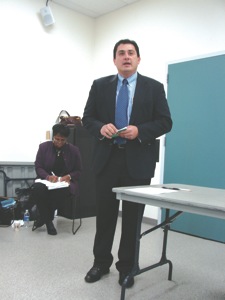san diego
Candidates for Assembly make campaign stop at democratic club
Healthcare, jobs among issues raised
Published Thursday, 28-Jan-2010 in issue 1153
Candidates for California Assembly including former city councilmember Toni Atkins, City Council President Ben Hueso and local businessperson Ralph Denney spoke about what they would do if they were elected to the state government body at a San Diego Democratic Women’s Club (SDWC) meeting, last Saturday.
“Toni, Ben and other good candidates in this room are going to be needing your help in the primary and tremendously in November,” said Assemblymember Marty Block, who welcomed the audience to the meeting held at the Weingart City Heights Library.
Both Atkins, who is a Democrat, and Denney, a Republican, are competing for Assemblymember Lori Saldana’s seat, who represents District 76 (West/North San Diego) and whose term ends this year. Hueso, a Democrat, is running for District 79 (Chula Vista, National City, Coronado and portions of San Diego). The district is currently represented by Democrat Mary Salas, who is running for state Senate. As of yet, there is no formal challenger to Hueso, however, Sweetwater Union High School District Board Member Pearl Quiñones, a Democrat, has been campaigning for the seat. Quiñones was invited to speak at the event, said SDWC Vice President Pat Washington, but she did not attend.
Following Block, candidates Atkins, Hueso and Denney explained why they were running for the assembly.
“I’m running to empower local government to stop the state raids on local funds to make sure that local governments can do their job, also to improve health care,” Hueso said. “The state government should step up and do something to pass a very progressive and very comprehensive health care program. We are the sixth largest economy. We can make health care a priority.”
“San Diego, sometimes we feel like we are at the very southern end of the world and they sort of forget us up there. I believe [that] when you go to Sacramento, you need to represent your community,” Atkins said. “I have a little bit of an accent, and I can be sort of soft every now and then but don’t mistake it for a lack of tenacity, drive and focus.”
Denney emphasized that he would work across party lines: “One of the primary strengths of Ronald Regan was his ability [to compromise]. If any of you came up to him and said, ‘You are a complete fool; I completely disagree with you on A, B, and D,’ he would turn around, face that person, grab their hand and say, ‘Well you must agree with me on C. So let’s work together to get C passed.’ And that, we certainly don’t see enough of anymore.”
After each candidate gave their introductions, individual audience members asked the group of candidates to answer questions, most of which focused on the candidates’ position on a particular issue.
SDWC member Michelle Krugman asked the candidates if they supported universal and single payer health care and if they would support the current state health care bill currently being debated in the legislature.
“Obviously, health care reform is necessary. But we’re not going to have healthcare reform unless we attack the problem itself, which is its escalading cost, double-digit inflation,” Denney said. “And no, I don’t agree with single payer. It’s expensive. Our unemployment rate is already hovering around 13 percent. Now is not the time to increase costs. We need to fix the state budget first.”
“Yes, I support Universal health care. But the one thing I think we have a responsibility to do is to make sure that we can pay for it,” Atkins said, who mentioned meeting with California Tax Association Director Lenny Goldberg, who is financing the state health care legislation. “[If I were elected] I would continue to work for that so we not only get it but can actually pay for it,” she added.
“For the people who have health care, health care is the highest tax that we pay of any tax there is. Who says that that tax that we pay now is affordable? Because it’s not. We need to bring it under control and the way to do that is by regulating,” Hueso said.
SDWC member Carla Mays asked the candidates what they would do to create jobs.
“For every business that leaves California, there are businesses that are coming in. We want those businesses. We want the clean tech business, what want the technology businesses, the ones that see values in our work force, the value that we can provide in terms of incentives for businesses to provide quality jobs. We don’t really care too much about the ones that are leaving because they don’t want to pay taxes. We want to invite the one’s who are willing to be part of the solution,” Hueso said.
“When we look at green tech, California is on the cutting edge: High tech, bio tech, all industries. These are good paying jobs with benefits and healthcare, most of the time. And so I think that California has to take advantage of that. And we can translate AB32, which is the major global warming bill, we can turn that into job creation,” Atkins said.
Denney said the state should cut taxes to create jobs.
“Not one of the prior speakers spoke about the fact that unemployment has come about partly because of the massive regulations, overregulation that our businesses are suffering from and taxes. The governor’s blue ribbon committee studied the situation and said, ‘If you want to lower unemployment, real simple, cut corporate tax, cut sales tax, give the people a break, and jobs will come back,’” Denney said.
|
|
Copyright © 2003-2025 Uptown Publications


